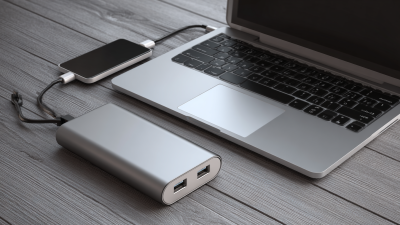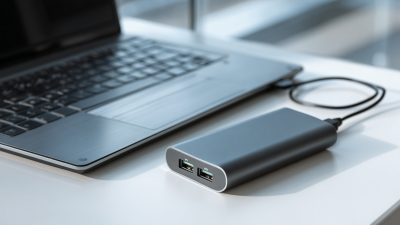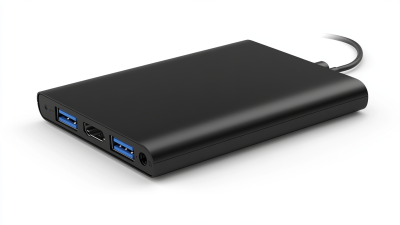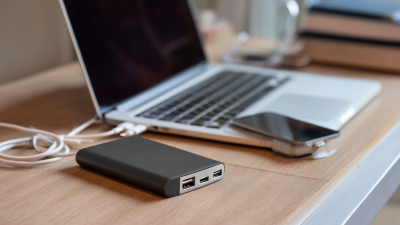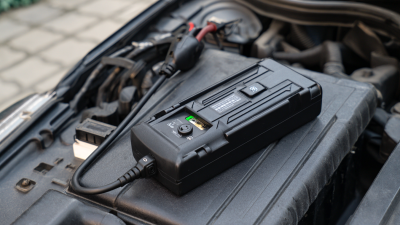Leave Your Message
 In today's fast-paced digital world, the importance of a reliable Mobile Laptop Charger has never been more pronounced. Recent studies indicate that over 70% of remote workers experience power-related interruptions that hinder their productivity, making the choice of a high-quality charger crucial. With the average laptop battery life dwindling to just 4-6 hours during intensive use, having a dependable charger is essential for maintaining efficiency and connectivity. Moreover, industry reports show that the market for mobile laptop chargers is expected to grow significantly, projected to reach $3 billion by 2025, reflecting the increasing reliance on mobile computing. Before making a purchase, it's vital to consider factors such as compatibility, charging speed, and portability to ensure your investment meets your daily demands.
In today's fast-paced digital world, the importance of a reliable Mobile Laptop Charger has never been more pronounced. Recent studies indicate that over 70% of remote workers experience power-related interruptions that hinder their productivity, making the choice of a high-quality charger crucial. With the average laptop battery life dwindling to just 4-6 hours during intensive use, having a dependable charger is essential for maintaining efficiency and connectivity. Moreover, industry reports show that the market for mobile laptop chargers is expected to grow significantly, projected to reach $3 billion by 2025, reflecting the increasing reliance on mobile computing. Before making a purchase, it's vital to consider factors such as compatibility, charging speed, and portability to ensure your investment meets your daily demands.
When purchasing a mobile laptop charger, compatibility with your specific laptop model is paramount. According to a report by the Consumer Technology Association, over 43% of consumers have purchased incompatible accessories, resulting in a waste of time and resources. To avoid this, it’s essential to check not only the voltage and amperage of the charger but also the connector type. Many laptops, particularly from major brands like Dell and HP, have unique designs, and using the wrong charger can lead to failure in charging and potential damage to the laptop.
In addition to ensuring the charger matches your laptop's specifications, it's crucial to consider the wattage. The Institute of Electrical and Electronics Engineers (IEEE) highlights that using a charger with lower wattage than required may lead to slow charging and insufficient power during intensive tasks. Conversely, using a charger with excessive wattage can sometimes cause overheating, which can damage internal components over time. Therefore, thorough research on your laptop’s requirements, including detailed technical specifications, is key in selecting a reliable mobile charger that guarantees both performance and safety.
This chart illustrates the key factors to consider when purchasing a mobile laptop charger. Each factor is rated on a scale from 1 to 10, indicating its importance in ensuring compatibility with your laptop model.
When considering a mobile laptop charger, understanding wattage is crucial. The power output of a charger, measured in watts, directly influences its ability to charge your devices efficiently. According to a report from the International Energy Agency, laptops typically require between 45W to 100W for optimal performance, depending on the model and its power demands. Many ultrabooks, like the MacBook Air, may only need 30W, while gaming laptops can exceed 200W under heavy use. Knowing the wattage requirements of your laptop ensures you choose a charger that meets its needs, preventing slow charging or potential damage.
Moreover, the trend towards USB-C charging has introduced additional considerations for users. A study by the USB Implementers Forum revealed that USB-C technology can support a range of wattage levels, from as low as 5W up to 100W or more. This versatility allows for a broader selection of chargers; however, it's essential to verify compatibility. A charger with insufficient wattage may not effectively power high-performance laptops, leading to inadequate battery replenishment. Therefore, analyzing both your laptop's wattage requirements and the charger's specifications is vital in making an informed decision before your next purchase.

When selecting a mobile laptop charger, one of the most critical factors is the balance between portability and performance. According to a recent report by the Consumer Technology Association, 85% of users prioritize portability, yet nearly 70% express dissatisfaction with charging speed. This dichotomy highlights the challenge manufacturers face in creating chargers that are both compact and powerful.
The ideal mobile charger should fit seamlessly into your lifestyle without sacrificing performance. For instance, while a 20,000mAh power bank may offer extensive charging capabilities, its bulky design can be a significant drawback for frequent travelers. On the other hand, smaller chargers with a capacity of around 10,000mAh may be highly portable but often result in slower charging speeds. Many brands now focus on rapid charging technologies, such as Power Delivery (PD) and Quick Charge, which can deliver up to 50% battery in just 30 minutes for compatible devices. Thus, understanding the trade-offs between size and charging speed can help consumers make informed decisions that best suit their needs.
| Feature | Consideration | Importance | Performance Rating |
|---|---|---|---|
| Weight | Lightweight for portability | High | 8/10 |
| Size | Compact design for easy carrying | Medium | 7/10 |
| Charging Speed | Fast charging capability | Very High | 9/10 |
| Compatibility | Works with various devices | High | 8/10 |
| Durability | Built to withstand travel and use | Medium | 7/10 |
When investing in a mobile laptop charger, safety should be a top priority. According to a report by the Consumer Electronics Association, nearly 30% of reported electronic device failures are due to overheating and faulty chargers. Therefore, it's crucial to look for chargers that come equipped with essential safety features. Over-voltage protection, short-circuit protection, and thermal cut-off mechanisms are vital to prevent damage to your devices and avoid potential hazards.
**Tips:** Always choose a charger that adheres to safety certifications such as UL and CE. These certifications ensure that the product has passed rigorous testing standards, reducing the risk of electrical malfunctions.
Another critical safety consideration is the compatibility of the charger with your specific laptop model. Many laptops require a unique voltage and amperage to charge efficiently. A survey by Tech Insights found that mismatched chargers account for 15% of laptop damage. Opting for a charger from a reputable manufacturer that lists compatibility with your device ensures not only safe charging but also optimizes performance.
**Tips:** Check user reviews and ratings for insights on the reliability and safety of the charger you are considering. Real-world experiences can often highlight safety features that technical specifications may not fully convey.

When it comes to purchasing a mobile laptop charger, budgeting is a crucial aspect to consider. The market is flooded with options ranging from affordable to premium-priced chargers, and it’s essential to find one that fits your financial plan without sacrificing quality. Start by setting a clear budget range based on your needs. Remember that a charger is a long-term investment; spending a little more on a reliable brand can save you from frequent replacements and potential damage to your laptop.
Next, don’t hesitate to shop around and compare prices across different retailers. Sometimes, online stores offer exclusive discounts or promotional deals that can significantly reduce costs. Additionally, keep an eye out for customer reviews and ratings; they can provide valuable insights into the charger's performance and durability.
By focusing on these budgeting tips, you can secure a charger that is both economical and efficient, ensuring your laptop stays powered up without making a dent in your wallet.
